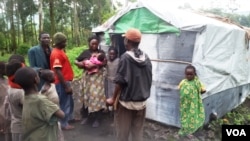Aid agencies say there’s a need to find long-term solutions for nearly 200,000 displaced people living in camps in the Democratic Republic of Congo. Three camps were closed in the DRC’s North Kivu province last month, and there likely are to be more closures, despite continuing insecurity in some areas.
The great majority of the estimated 700,000 displaced people in North Kivu are not living in camps and are not receiving food aid.
Nevertheless, donors are getting tired of paying for the 57 camps in the province, says Ben Oduwa, a spokesman for the International Organization for Migration in North Kivu.
"The donors have been funding the same things for a long time and funds are getting short, "Oduwa told reporters.
Part of the reason for donor fatigue is the realization that the number of people in camps has been exaggerated. Last year, after night-time checks were carried out at 31 sites in North Kivu, the numbers at those sites were found to be two-thirds lower than initial estimates, according to a joint report by the organizations managing the camps in North Kivu.
Some of that reduction would have been due to improved security enabling people to return home, but the report clearly suggests that another reason was inflated figures.
This year, five camps near Goma have been closed and the people there have mostly returned to their home villages or resettled in areas near Goma.
VOA spoke to a formerly displaced person, Jean Pierre Havugimana, who left the Lac Vert camp near Goma last month and returned to his village, Kimoka.
"I am very happy to be back home, because people did not eat well at the camp and washing was difficult, whereas life is much better in my village. I want to thank the organizations who helped the returnees, but we also need tools like machetes and hoes as well as seeds for farming," said Havugimana.
His neighbor Furaka Songo is vice president of the group of people from the Lac Vert camp who have moved to Kimoka.
"I and my family were promised seeds that have not yet arrived, and that makes life difficult for us because we depend on agriculture for our food,"s aid Songo.
The seed distribution is the responsibility of the U.N. Food and Agriculture Organization and was supposed to have happened by the middle of last month.
Ben Oduwa of the International Organization for Migration told VOA it’s been delayed.










